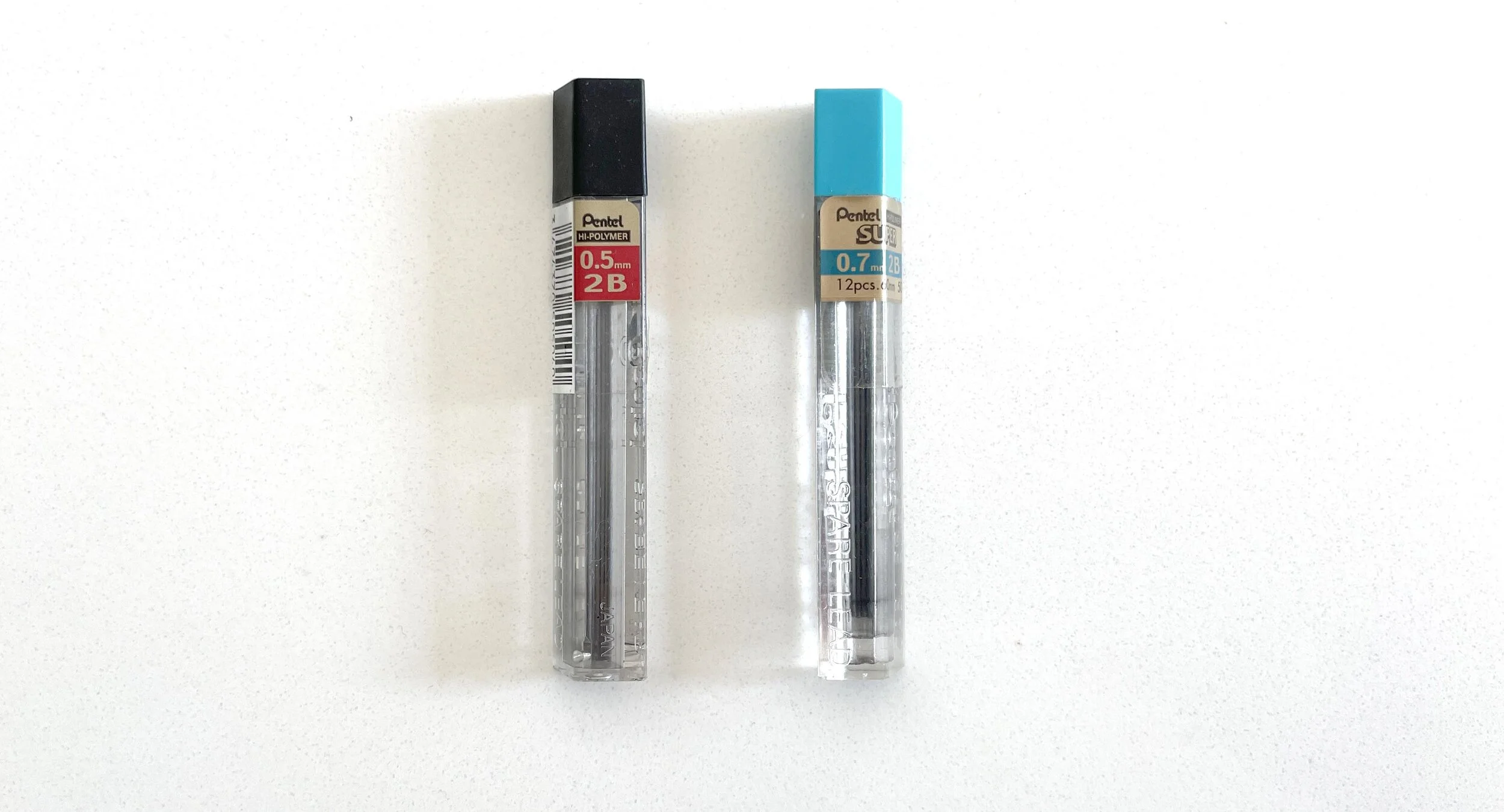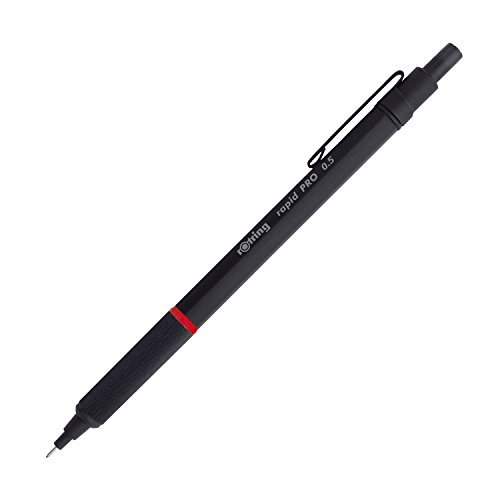best pencils to write with

Best Mechanical Pencil
Disclaimer: As an Amazon Associate I earn from qualifying purchases. There are affiliate links in this post. This means that at no cost to you, I will receive a commission if you purchase through my link. I will only ever promote the products and services that I trust and 100% recommend. You may read my full disclosure policy for more information. Thank you for supporting my business in this way.
These versatile pencils are a must-have for writing, note-taking, and sketching for both students and professionals. To help you select which one is best for you, I have outlined the various features below along with a list of the best mechanical pencils for writing currently available.
UPDATED: October 4, 2021.

MY TOP PICK:
If you are looking for the best overall, I recommend the rOtring Rapid PRO because it features a durable full-metal body and a knurled grip to reduce slippage when writing. Available in 0.5 mm, 0.7 mm and 2 mm versions.
What is a mechanical pencil?
A mechanical pencil differs from a standard pencil primarily because it offers the ability to continually replace the lead without having to replace the pencil. This also has the benefit of never needing sharpening. The consistent diameter of the lead allows for a consistent line thickness as the lead is used.
History
The first patent for a mechanical pencil was filed in 1822 by British silversmith Sampson Mordan. In the 200 years since the patent filing, the design of today's mechanical pencils has remained remarkably similar.

By Published for the proprietors by T. and G. Underwood - The Repertory of patent inventions Link
RELATED:
The Best Sketchbooks That Will Make You A Better Designer
The Best Drafting Pencils
Mechanism
The exact setup varies by model but most mechanical pencils today use a ratchet system that holds the lead in place via jaws within the tip. These jaws grip the lead and are controlled by a spring mechanism that connects to a button at the end of the pencil. When the button is pushed it opens the jaws and allows the lead to advance out. The lead sits within the shaft which sits within the sleeve which either supports or makes up the grip.
As shown in the image below there is a lot of components that go into even a simple pencil design. As you can see in these two different pencils, while the exact design is different, many of the same elements are the same. The upper pencil is primarily used for drafting while the lower is used for writing.

Here of some features and components to be aware of when selecting a specific pencil:
Materials
Most mechanical pencils are constructed from plastic and metal components. The higher-end models will typically use more metal elements as they tend to last longer and offer superior durability. However, metal will typically make for a heavier pencil which is something to keep in mind if you are continuously writing for long periods.
Grips
The grip is the most important component of the pencil as it is where most of your contact takes place. The most common types are textured metal known as a knurled grip or a soft rubber grip. The advantage of metal is that it does not become worn over time, as with rubber, and it tends to be less slippery if your fingertips become damp. Generally, it comes down to personal preference as you what you find more comfortable when writing.
Auto-Rotation
Some advanced models such as the Uni Kuru Toga (see below) offer a system that automatically rotates the pencil lead out of the holder each time the lead touches the paper. This has the advantage of the lead not forming a tapered shape with causes inconsistencies in the line thickness. It tends to not work as well with cursive writing as it is not lifted off the paper enough times to advance the lead appropriately. However, some manufacturers have developed faster-advancing mechanisms to keep up with this writing style.
Retractable Lead Guide Pipe
Some models offer a retractable lead guide pipe that allows it to retract back into the cone of the pencil. This keeps the projection from sticking out preventing it from becoming damaged while not in use and also not poking through a pocket fabric.
Lead Sizes
While called "lead" it is typically made from graphite. Most mechanical pencils are designed to only accept one diameter of lead, however some advanced models can accept a range of lead widths. Lead diameters are measured in millimeters and can range from a very fine 0.2 mm for technical work up to 2 mm for drafting lead holders.
The most commonly used standard lead sizes for general writing are 0.5 mm and 0.7 mm. This in turn will determine the average line thickness. If you find the lead regularly breaks when you write, you may want to go with the thicker 0.7 mm option.
Lead refills are stored in small tubes as shown below, so they are ready to top up the supply within the pencil itself.

Lead Hardness
Just like with standard pencils, mechanical pencil leads are available in many different hardness levels to suit a particular writing or drawing project. The most common hardness is 2B, as shown in the image above. You may remember from buying school supplies the requirement of a "number two" pencil refers to the hardness. The 2B hardness level offers a nice compromise that is not so hard that it is difficult to write on paper but not so soft that it is constantly breaking.
Lead Hardness Grade Indicator
Some of these pencils include a lead hardness grade indicator that can be turned to display the 2B, B, HB, H, etc. through a small window on the pencil. This is helpful to keep track if you are using multiple pencils with different hardnesses.
Colored Lead
There are some colored lead options available that can be helpful when taking detailed notes or writing comments in red, for example.
Refillable Erasers
For the pencils that include an eraser at the end, most offer the ability to get replacements. These are sold just like lead refills in small tubes that allow you to easily replace the eraser once it has worn down.
Some pencils have an eraser cap that covers the easer and makes it easier to click to advance the lead since you are pushing on a solid material instead of a soft eraser. However, this does require removing the cap every time you want to use the eraser.
So here is my list of The Best Mechanical Pencils For Writing.
Enjoy!
Best Overall: rOtring Rapid PRO Mechanical Pencil

The rOtring Rapid PRO is a long-lasting, smooth, and precise retractable mechanical pencil that is a perfect professional tool for writing, sketching, and drawing.
-
Features a sliding sleeve and cushioned lead mechanism provide a high break resistance and outstanding writing and doodling comfort.
-
Equipped with a unique push mechanism for controlled lead transportation.
-
Includes a built-in sharpener under the push-button cap.
Check out this unboxing video of the Rotring Rapid Pro (2mm Silver):
Runner-up: Pentel Kerry P1035-CD Mechanical Pencil

The Pentel Kerry pencil is designed for precise writing with a metal grip for control.
-
Offers a compact size that comfortably fits in pockets and purses.
-
Equipped with a removable cap for balance while writing and protects the writing point when the pencil is not in use.
-
Refillable with Hi-Polymer lead and Z2-1N refill eraser.
Best Premium Option: LAMY 7 mm 2000 Mechanical Pencil

The LAMY 7 mm 2000 pencil features a pocket-safe conical tip.
-
Includes a long, replaceable eraser with an attached clean-out rod for clearing lead jams.
-
Features a lead size indicator printed on the top of the push button.
-
Accepts standard 0.7mm leads, and the Lamy Z10 eraser.
-
Features a brushed Makrolon resin barrel.
-
Equipped with brushed stainless steel trims and an articulated clip.
Best Grip: Pentel Graph Gear 1000 Mechanical Pencil

The GraphGear 1000 features a metallic grip with soft, latex-free pads for extra control and support.
-
Features a dual-action retractor that protects lead.
-
Includes a built-in lead hardness indicator.
-
Features a solid design and weighted at the fingertips for precise comfort and control.
-
Loaded with Pentel Super Hi-Polymer HB Lead that does not require sharpening, and produces a clear dark line.
Best Consistent Line Thickness: Uni Kuru Toga M510171P.43 Mechanical Pencil

The Uni mechanical pencil features a turning mechanism that continuously rotates the lead that allows for a consistent lead thickness.
-
Equipped with a spring-loaded clutch that gradually twists the lead when lifted from the paper creating a uniform line.
-
Maintains a continuous sharp point that is designed for intricate writing tasks.
-
Uses 0.5 mm lead for crisp, precise lines
-
Equipped with a refillable capped eraser.
-
Features a metal nose cone for long-lasting durability.
Best Budget Option: Pentel GraphGear 500 Mechanical Pencil

The GraphGear 500 features a 4mm fixed sleeve for detailed writing and technical drawings.
-
Includes a metallic-mesh grip delivers precision and control.
-
Features a top click, stationary eraser and tip.
-
Refillable with Pentel Super Hi-Polymer Lead and Z21 refill eraser.
Best Value: Pentel Sharp Kerry P1035A Mechanical Pencil

The Pentel Sharp Kerry is crafted with precise tools to create an accurate writing instrument.
-
Offers a capped design to provide pocket and purse protection when being stored.
-
Features a pocket-sized design for portability and flexibility.
-
Includes Pentel replaceable Z23-1 eraser refill.
Best Stainless Steel Option: Zebra M-701 Mechanical Pencil

The Zebra's Steel line offers a significant upgrade from everyday plastic writing instruments.
-
Features a heavy-duty stainless steel barrel with a knurled grip that ensures superior writing stability.
-
Offers a design that includes a steel grip for a durable setup.
Best Combo Set: Jimmidda Mechanical Pencil

The Jimmidda set includes both a 0.5 mm and 0.7 mm lead pencil to provide options for various writing tasks.
-
Features a metal threaded grip and anti-skid design.
-
Equipped with a side clip for attaching to a pocket and reduces rolling on flat surfaces.
-
Includes a retractable nip to protect the lead and for drop resistance.
-
Comes with an eraser and lead refills.
Best Lead Options: Staedtler 925 25-03 Silver Series Mechanical Pencil

The Staedtler Silver Series features a knurled grip to reduce slippage while writing or drawing.
-
Features a ribbed top click to advance the lead.
-
Equipped with a pocket clip for easy carrying and to prevent rolling off a table.
-
Available in 0.3mm up to 2mm lead sizes.
I hope this list of the best mechanical pencils for writing was helpful.
If you think I left out one that is important or have a suggestion for a future article, let me know in the comments below.
Brandon Hubbard, AIA, NCARB, LEED AP BD+C
best pencils to write with
Source: https://www.thearchitectsguide.com/articles/best-mechanical-pencil-for-writing
Posted by: anthonyseellive.blogspot.com

0 Response to "best pencils to write with"
Post a Comment